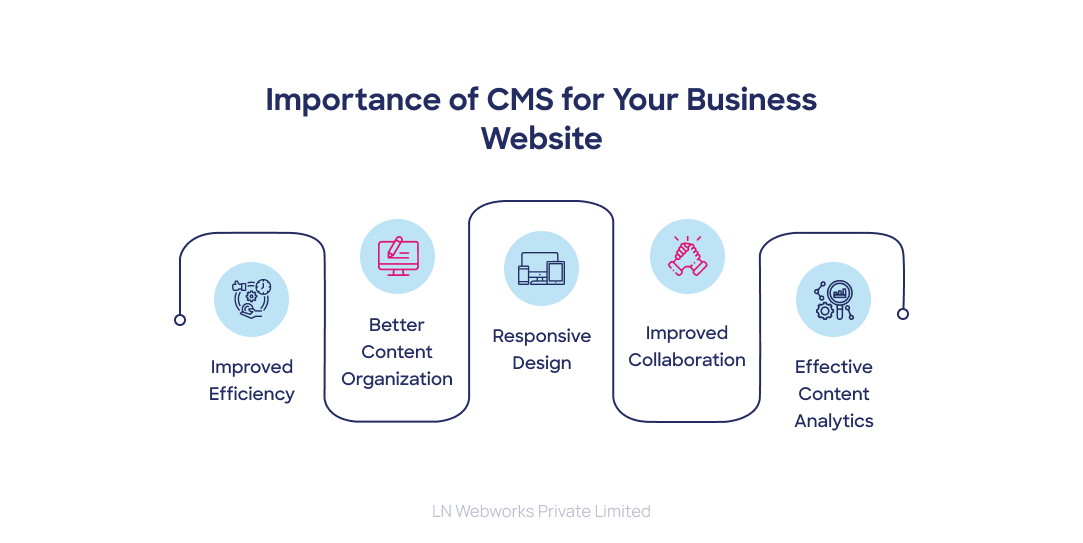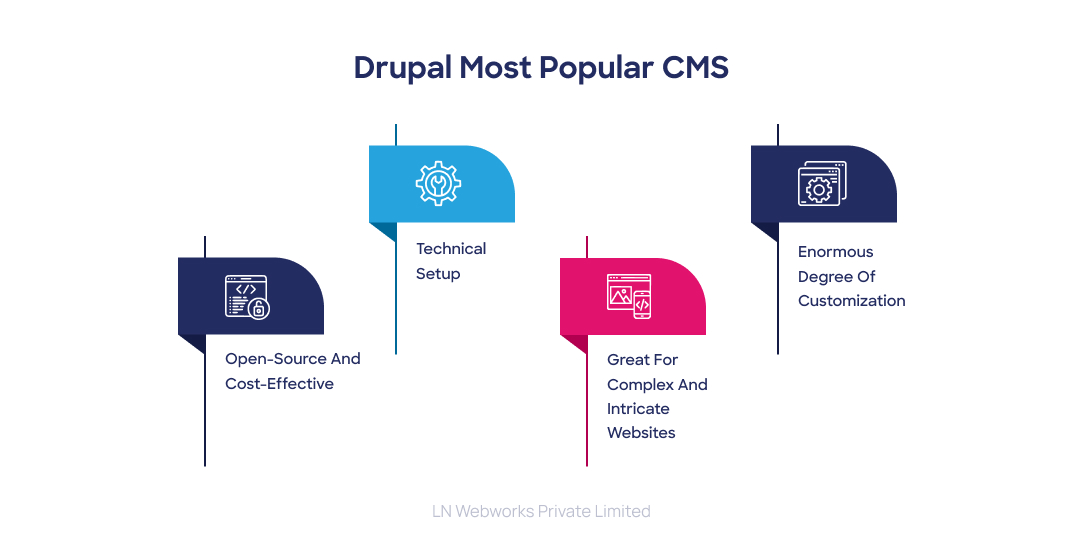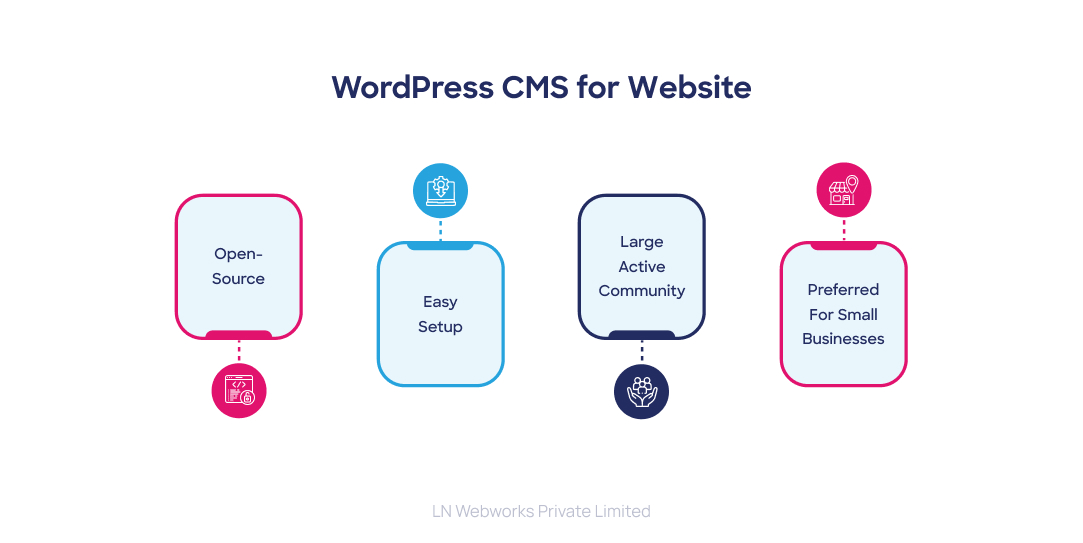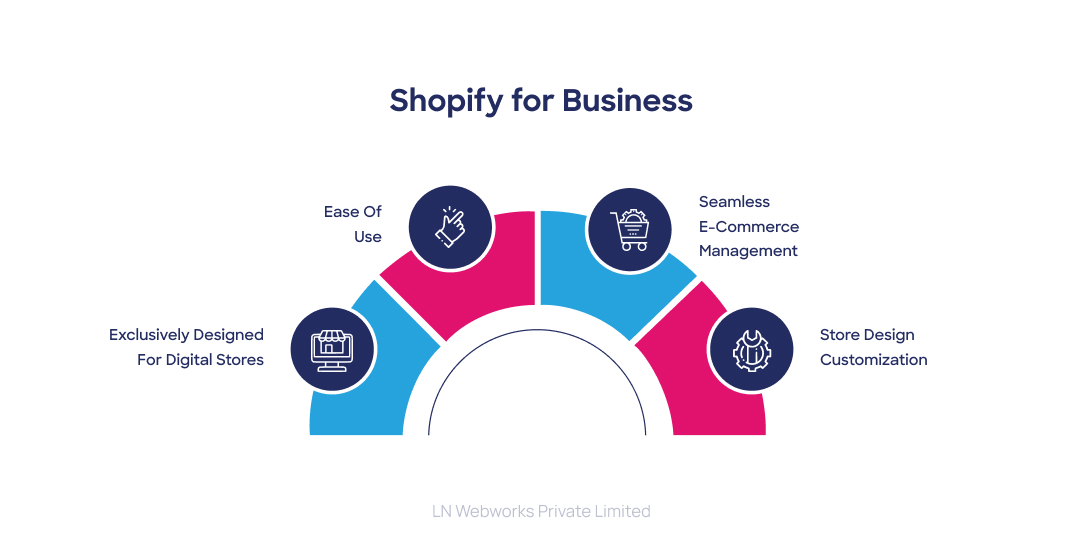Drupal, Shopify, or WordPress: Which is Better for Business Website?

Your website is your digital storefront which your customers can access anytime and from anywhere. It reflects your business’s values, ethics, offerings, and everything else. With all these things, your site acts as a bridge that connects you and your customers and contributes a fair share in determining the fate of your business. Given that, your website should be nothing less than phenomenal.
When it comes to creating a business website, there is an abundance of options to choose from. However, Drupal, WordPress, and Shopify are the three most preferred content management systems (CMSs) worldwide. This blog sheds light on the strengths and weaknesses of each to help you easily choose between Drupal development, WordPress development, and Shopify development. But, before moving to that, let’s understand what a CMS is and how it benefits a business website.
What is a CMS and Why is it Important for Your Business Website?
As the name suggests, a content management system or a CMS is software that empowers users to create, manage, and publish website and application content effortlessly. No technical expertise is required for using the software. This is a major reason why a majority of organizations are tapping into the potential of CMSs. Why hire a technical team for content management and spend your funds, when you can opt for a CMS? Now that we have discussed the basic information about content management systems, it’s time for us to dig into the benefits of using them.

Improved efficiency
CMSs make content publishing a piece of cake and hence, improve the overall efficiency of the process. This is a great advantage, especially for organizations requiring swift content upgrades.
Better content organization
CMSs promote structural organization of content which aids in easy finding and categorization of content.
Responsive design
Content management systems are responsive and mobile-friendly. This implies that they can seamlessly support mobile users irrespective of screen size.
Improved collaboration
Content management systems promote better collaboration by empowering different teams to work in a close-knit web. As these solutions separate website content from design and functionality, content teams can focus on content while development teams can work on the design aspects. By assigning specific user roles and roles, the administration can control who can do what.
Effective content analytics
CMSs possess built-in analytics tools for monitoring user behavior and content performance. Data-driven insights promote better decision-making and help improve customer experience.
A Detailed Comparison of the Most Popular CMSs
Drupal, WordPress, and Shopify are the most popular content management systems available in the market. All three have a user-friendly interface, possess incredible scalability, and have large communities of supportive experts. This makes picking one of them quite a perplexing decision. In this section, we’ll talk about the various factors that distinguish these platforms. In light of this awareness, you can choose the one that best suits your needs.
Drupal
Open-source and cost-effective
Drupal is an open-source content management system that is freely available to the public to use, modify, and distribute. There is no licensing fee which makes it a cost-effective solution. Though the core software is available free of cost, it is crucial to note that you may have to pay for other services including web hosting, third-party modules, and paid premium modules.

Technical setup
Drupal requires some technical knowledge to set up. A basic understanding of HTML, PHP, CSS, and other web technologies is a must. Hence, you’ll require an in-house Drupal development team or you can contact a reputed Drupal development company for assistance.
Great for complex and intricate websites
Drupal enjoys the stature of being one of the best content management systems for handling complex and intricate websites. It doesn’t matter whether your website is small with a few pages or large with an abundance of content, Drupal’s performance remains unmatchable in both cases. It is designed to ensure quick load times and impressive website performance.
Enormous degree of customization
One thing that gives Drupal a clear edge over all other content management systems is the exceptional degree of customization it offers. You can effortlessly create and define custom content types, develop your own themes, and choose from a variety of integration options.
WordPress
Open-source
Like Drupal, WordPress is also an open-source CMS which means it is available for use, modification, and distribution by the general public without having to pay for a license. This implies that WordPress is also a cost-effective solution like Drupal. However, WordPress development is generally cheaper than Drupal development as Drupal involves a steep learning curve.
Consequently, Drupal developers charge more for rendering their services. Besides, Drupal offers an incredible degree of customization. As developers have to dedicate more time to extensive customization, Drupal development naturally costs more.

Easy setup
WordPress possesses an intuitive and user-friendly interface. Even those without technical expertise can perform the basic setup. If you do not have a coding background and wish to create your website on your own, WordPress might be a better alternative compared to Drupal. However, we cannot base our decision on just one parameter. So, don’t forget to keep the entire picture in mind while making a choice.
Large active community
WordPress and Drupal both possess an active community of developers and designers ever-ready to help their fellow community members. However, WordPress has a larger community as compared to Drupal.
Preferred for small businesses
Though both Drupal and WordPress can be used by small businesses, the latter is a preferred choice. This is because it is more affordable, user-friendly, and easier to set up.
Shopify
Exclusively designed for digital stores
Shopify is an e-commerce software. It is paid and particularly designed for developing online stores. Drupal and WordPress can also be used to create digital stores but what makes Shopify different is that its purpose is the creation of online stores.

Ease of use
Shopify is a user-friendly and intuitive platform. It is a no-code solution which means you can utilize it to set up your e-commerce website effortlessly even without having any technical know-how. The platform is also power-packed with premade templates for building professionally designed and responsive sites.
Seamless e-commerce management
As Shopify is exclusively designed for creating online stores, it is equipped with multitudinous features for inventory management, payment processing, and handling shipping and taxes.
Store design customization
As with Drupal and WordPress, Shopify also offers enormous store customization. You can select from a range of professionally designed themes that can be customized according to your business’s individual requirements. You can choose your preferred colors, fonts, and layout and build a store that perfectly aligns with your needs.
Let’s Wrap Up
Drupal, WordPress, and Shopify all three rank among the top content management systems which makes it quite challenging to choose one of them. However, the detailed comparison provided in this blog can help you decide between Drupal development, Shopify development, and WordPress development. When it comes to Drupal, it is best for developing complex, highly customized, and intuitive websites. WordPress is preferred by small businesses due to low-cost development. Shopify is a paid software specially developed for creating online stores.
If you still find it challenging to make a choice, LN Webworks, a reputed Drupal development company can assist you with it. Our proficient Drupal developers are well-versed in the strengths and weaknesses of all these solutions. So, contact us today to get an unbiased idea about which of the three will best suit your business.
